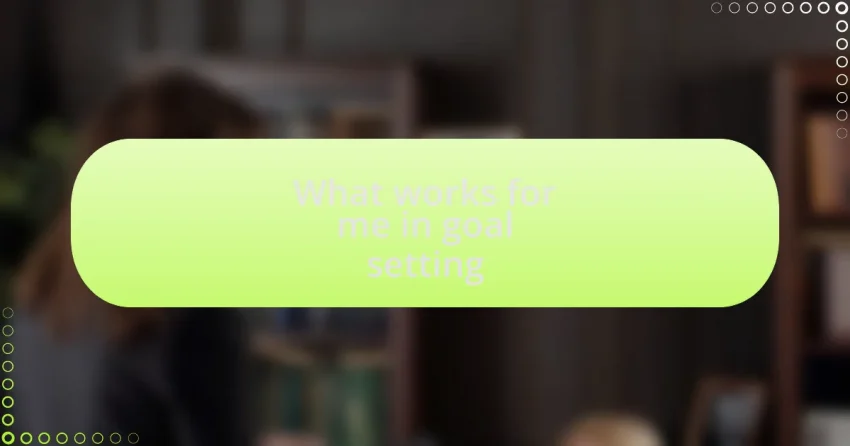Key takeaways:
- Specificity in goal setting enhances motivation and measurable progress.
- Flexibility allows for adaptation to shifting interests and maintaining relevance.
- Digital tools, such as Trello and mind mapping software, improve organization and clarity in achieving goals.
- Regular evaluations and milestone celebrations help maintain motivation and reflect on progress.
Author: Evelyn Hartwood
Bio: Evelyn Hartwood is an acclaimed author known for her enchanting tales that blend magical realism with poignant human experiences. With a degree in Literature from the University of California, Berkeley, she has captivated readers worldwide with her lyrical prose and richly developed characters. Evelyn has published three best-selling novels, including “Whispers of the Willow” and “The Echoing Silence,” both praised for their emotional depth and imaginative storytelling. When she’s not writing, Evelyn enjoys exploring the outdoors, indulging her passion for nature photography, and hosting workshops that inspire aspiring writers. She currently resides in a quaint cabin in the Pacific Northwest, where she finds endless inspiration among the towering trees and serene landscapes.
Understanding goal setting fundamentals
Goal setting is about clarity and intention. I’ve often found that when I set vague goals, like “I want to be a better commentator,” I lose motivation quickly. It’s in the specifics, like “I will analyze two political articles weekly,” that I really tap into my dedication and see measurable progress.
It’s fascinating how emotions play a role in goal setting. I vividly remember a time when I felt overwhelmed by the political landscape, doubting my ability to contribute meaningfully. But by breaking my goals down into small, achievable steps, I was able to reclaim my confidence. Has there been a moment like that for you, where conquering smaller tasks made a larger goal seem more attainable?
One fundamental aspect I’ve embraced is the importance of flexibility. Life is unpredictable, and sometimes our original goals may no longer resonate. I once aimed to write a series of critiques on political speeches but found my interests shifting as I engaged more with grassroots movements. Adapting my goals not only kept me relevant but also ignited a deeper passion in my work. How do you handle shifts in your focus when pursuing your goals?
Personal experiences with goal setting
Setting personal goals has been a transformative experience for me, especially in the realm of political commentary. I remember when I first set out to increase my understanding of different political ideologies. Instead of trying to absorb everything at once, I focused on one ideology per month. This method made the process less daunting and allowed me to dive deep into each subject, enriching my commentary in the long run.
Another memorable chapter in my goal-setting journey was when I established a goal to engage more with my audience. I set aside time each week to interact with comments on my articles. This was not only a valuable feedback loop but also a way to connect emotionally with my readers. Have you ever felt that kind of connection? For me, it transformed how I approached writing, making it more about dialogue than mere monologue.
There have been times when I had to confront the fear of failure head-on. I recall a specific instance when a piece I thought would resonate failed to gain traction. Instead of giving up, I used it as a learning experience. I analyzed what went wrong and adjusted my future goals accordingly. This experience not only built resilience but taught me the importance of viewing setbacks as stepping stones. How do you reflect on your experiences to refine your goals?
Tools for setting political goals
When it comes to setting political goals, I find that utilizing digital tools can significantly enhance my focus and productivity. For example, I use platforms like Trello to break down larger objectives into manageable tasks, keeping my projects organized. Have you ever tried visualizing your goals? It can transform how you approach them.
Another tool I’ve found invaluable is the use of mind mapping software. It’s fascinating how such a simple visual representation can help clarify my thoughts and expand my understanding of complex political scenarios. When I was mapping out my thoughts for a series on voter engagement, it became clear where my insights were lacking, prompting me to research further. Have you ever had an idea crystallize simply by laying it out visually?
Lastly, I can’t stress enough the importance of connecting with like-minded individuals through online communities or forums. This interaction not only provides motivation but also exposes me to diverse perspectives. I remember joining a political discussion group where individuals shared their goals openly. This exchange inspired me to refine my own aspirations while also building a sense of camaraderie. Do you engage with others when setting your political goals, and how has that shaped your journey?
Evaluating progress in goal setting
Evaluating progress in goal setting is essential for staying on track. Regular check-ins help me reflect on what’s working and what isn’t. For instance, I like to set aside time weekly to review my goals against what I’ve achieved, and this practice often reveals surprising insights. Have you ever discovered that a minor adjustment can lead to significant progress?
One of my favorite methods for evaluation involves setting milestone markers. When I was working on a campaign strategy, I set specific dates to assess my outreach efforts. At each milestone, I took a moment to celebrate small victories, which kept my motivation high. It made me wonder, how often do we pause to acknowledge the small wins along the way?
Lastly, feedback is an invaluable component of my evaluation process. I like to seek input from trusted colleagues or mentors after significant attempts at goal achievement. Their perspectives often highlight aspects I might overlook, leading me to rethink my approach. Have you reached out for feedback, and how has it influenced your perspective on your progress?
